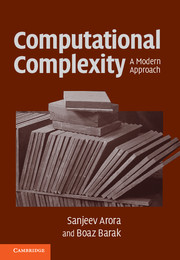Book contents
- Frontmatter
- Contents
- About this book
- Acknowledgments
- Introduction
- 0 Notational conventions
- PART ONE BASIC COMPLEXITY CLASSES
- 1 The computational model – and why it doesn't matter
- 2 NP and NP completeness
- 3 Diagonalization
- 4 Space complexity
- 5 The polynomial hierarchy and alternations
- 6 Boolean circuits
- 7 Randomized computation
- 8 Interactive proofs
- 9 Cryptography
- 10 Quantum computation
- 11 PCP theorem and hardness of approximation: An introduction
- PART TWO LOWER BOUNDS FOR CONCRETE COMPUTATIONAL MODELS
- PART THREE ADVANCED TOPICS
- Appendix: Mathematical background
- Hints and selected exercises
- Main theorems and definitions
- Bibliography
- Index
- Complexity class index
4 - Space complexity
from PART ONE - BASIC COMPLEXITY CLASSES
Published online by Cambridge University Press: 05 June 2012
- Frontmatter
- Contents
- About this book
- Acknowledgments
- Introduction
- 0 Notational conventions
- PART ONE BASIC COMPLEXITY CLASSES
- 1 The computational model – and why it doesn't matter
- 2 NP and NP completeness
- 3 Diagonalization
- 4 Space complexity
- 5 The polynomial hierarchy and alternations
- 6 Boolean circuits
- 7 Randomized computation
- 8 Interactive proofs
- 9 Cryptography
- 10 Quantum computation
- 11 PCP theorem and hardness of approximation: An introduction
- PART TWO LOWER BOUNDS FOR CONCRETE COMPUTATIONAL MODELS
- PART THREE ADVANCED TOPICS
- Appendix: Mathematical background
- Hints and selected exercises
- Main theorems and definitions
- Bibliography
- Index
- Complexity class index
Summary
[Our] construction … also suggests that what makes “games” harder than “puzzles” [e.g., NP-complete problems] is the fact that the initiative [“the move”] can shift back and forth between the players.
– Shimon Even and Robert Tarjan, 1976In this chapter we study the memory requirements of computational tasks. To do this we define space-bounded computation, which places limits on the number of tape cells a TM can use during its computation. We define both deterministic and nondeterministic versions of such machines and study complexity classes of problems solvable by such machines. In Sections 4.2.1 and 4.3.2, we show some surprising relations between these variants.
As in the case of NP, we define a notion of complete problems for these classes, and identify concrete and interesting problems that are complete for space-bounded classes. It turns out that for polynomial space bounds, the complete problems involve finding winning strategies in two-player games with perfect information such as Chess and Go (see Section 4.2.2). As pointed out in Even and Tarjan's quote at the beginning of the chapter, our current understanding is that computing such strategies is inherently different from (and possibly more difficult than) solving NP problems such as SAT.
We also study computations that run in sublinear space–in other words, the input is much larger than the algorithm's work space.
- Type
- Chapter
- Information
- Computational ComplexityA Modern Approach, pp. 78 - 94Publisher: Cambridge University PressPrint publication year: 2009



